The 2020 Mac Mini Unleashed: Putting Apple Silicon M1 To The Test
by Andrei Frumusanu on November 17, 2020 9:00 AM ESTBenchmarks: Whatever Is Available
As we’ve had very little time with the Mac mini, and the fact that this not only is a macOS system, but a new Arm64-based macOS system, our usual benchmark choices that we tend to use aren’t really available to us. We’ve made due with a assortment of available tests at the time of the launch to give us a rough idea of the performance:
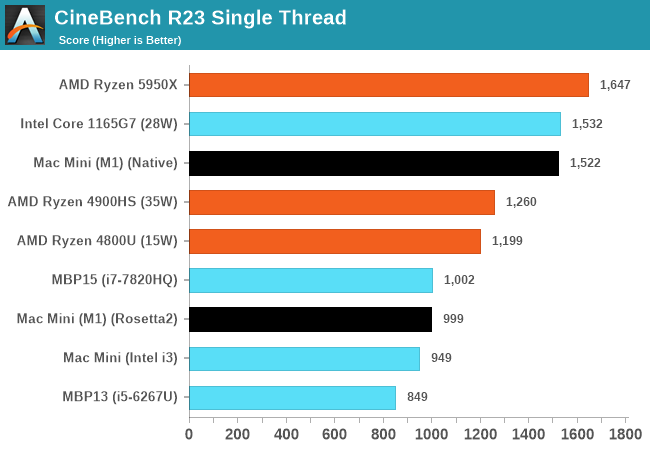
One particular benchmark that sees the first light of day on macOS as well as Apple Silicon is Cinebench. In this first-time view of the popular Cinema4D based benchmark, we see the Apple M1 toe-to-toe with the best-performing x86 CPUs on the market, vastly outperforming past Apple iterations of Intel silicon. The M1 here loses out to Zen3 and Tiger Lake CPUs, which still seem to have an advantage, although we’re not sure of the microarchitectural characteristics of the new benchmark.
What’s notable is the performance of the Rosetta2 run of the benchmark when in x86 mode, which is not only able to keep up with past Mac iterations but still also beat them.
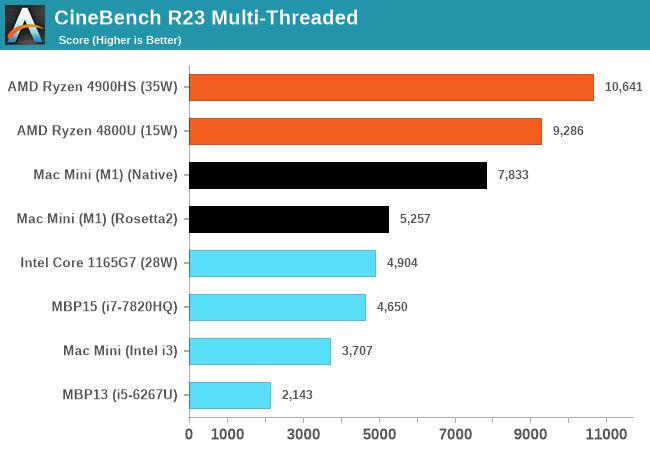
In the multi-threaded R23 runs, the M1 absolutely dominates past Macs with similar low-power CPUs. Just as of note, we’re trying to gather more data on other systems as we have access to them, and expand the graph in further updates of the article past publishing.
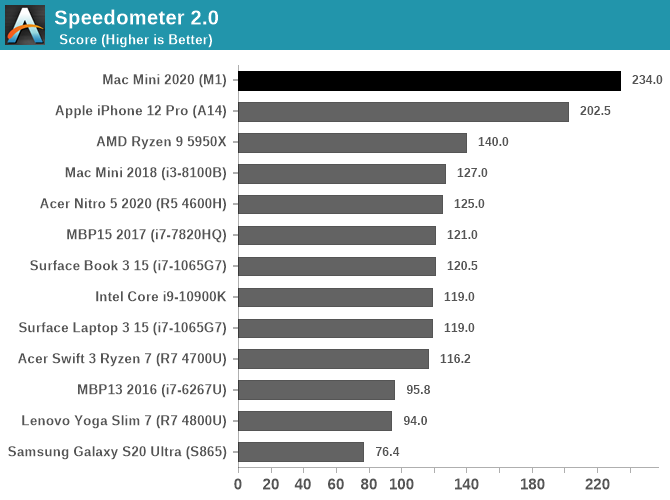
In browser-benchmarks we’ve known Apple’s CPUs to very much dominate across the landscape, but there were doubts as to whether this was due to the CPUs themselves in the iPhone or rather just the browsers and browser engines. Now running on macOS and desktop Safari, being able to compare data to other Intel Mac systems, we can come to the conclusion that the performance advantage is due to Apple’s CPU designs.
Web-browsing performance seems to be an extremely high priority for Apple’s CPU, and this makes sense as it’s the killer workload for mobile SoCs and the workload that one uses the most in everyday life.
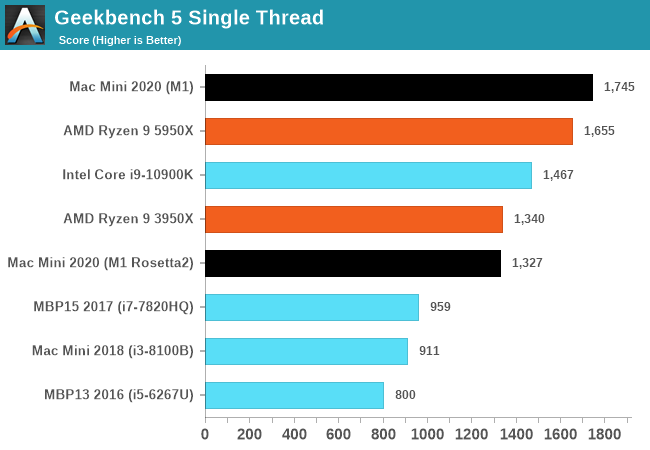
In Geekbench 5, the M1 does again extremely well as it actually takes the lead in our performance figures. Even when running in x86 compatibility mode, the M1 is able to match the top single-threaded performance of last generation’s high-end CPUs, and vastly exceed that of past iterations of the Mac mini and past Macbooks.
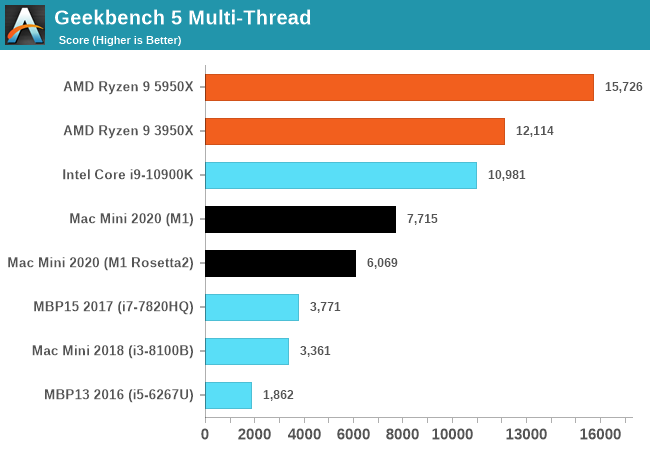
Multi-threaded performance is a matter of core-count and power efficiency of a design. The M1 here demolishes a 2017 15-inch Macbook Pro with an Intel i7-7820HQ with 4 cores and 8 threads, posting over double the score. We’ll be adding more data-points as we collect them.


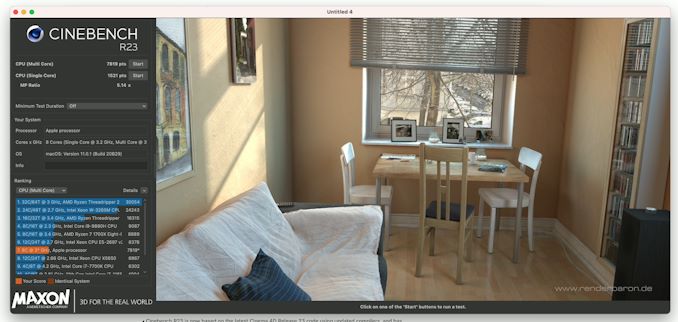








682 Comments
View All Comments
briceio - Wednesday, November 18, 2020 - link
Oh crap, I just sold my MBP16, my Apple TVs, my iMac, and the iPad Pro of my wife... thinking Apple was going anywhere those last years... speak about good decisions & timing.dontlistentome - Wednesday, November 18, 2020 - link
Going to buy one, mostly out of geeky fascination for new stuff (even if it looks and acts like old stuff).Re the power consumption - does read a little like you're disappointed by this, lots of excuses/reasons for it being broadly in line to what's already out there at the low power end. Would love to see a Zen 3 laptop running an external display (lid shut) benchmarked as a comparison. Would there be any difference? I suspect not...
dizzynosed - Wednesday, November 18, 2020 - link
Me too. Which one u will buy. I will go for the cheapest airbook.joms_us - Wednesday, November 18, 2020 - link
It is laughable to see how you continue to use Geekbench and the primitive version of Spec to compare ARM to x86 counterparts and then tout how godly superior it is. Just look at the huge discrepancies between native and rosetta mode. That is why you should compare two processors with same OS or same architecture (be it emulated)dizzynosed - Thursday, November 19, 2020 - link
Why? Why should we not compare how fast can it accomplish a task?abufrejoval - Wednesday, November 18, 2020 - link
Honestly, I am perhaps most impressed with how well the Ryzen 4800U did in Cinebench, especially the multicore. Sure, it's 8 big cores vs. probably just 4 big ones on the M1, but it's Zen 2 and 7nm so there is still potential to reduce the gap.And when you look at Geekbench results, there is one observation that sticks out very visibly and applies to both Geekbench 4 and 5:
Windows results for identical hardware are the worst, significantly bettered by Linux result and again trumped by MacOS results.
The explanation: The compilers are simply not the same and it shows.
My Ryzen 7 5800X stays shy of 1700 on Windows for single score, but goes beyond on Linux.
The first leaks in excess of 2000 on Ryzen 5000 were all on "MacOS/iMacPro1,1" or Hackintoshs.
I'd guess they are using a Microsoft compiler for Windows, GCC on Linux and LLVM on MacOS.
So to avoid comparing apples to lemons you need to compare the M1 to an 4800U Hackintosh, or better yet, Linux on both.
Alas, without Linux M1 is useless to me. Shame, because the silicon and the box seems pretty nice, apart from that partially eaten fruit that's turned a rather less appetizing black over time.
I am ready to bet a case or two of beer, that if Apple sold M1 to PC makers and opened their M1 hardware up to run Windows and Linux/Android for ARM, that would outsell PC running MacOS by far.
milli - Wednesday, November 18, 2020 - link
That's exactly the thing that bothers me about Geekbench but this fact is mostly missed by the community.It is kind of funny that the Anand staff thinks it can draw so many conclusions about the underlying chip performance all the while running different OS' on these CPU's. Obviously, for now, running anything else than macOS on M1 is far fetched but as you say, you can run Hackintosh on AMD. If not that, then at most it's a platform comparison.
Even running SPEC with the same compiler is up for debate vs optimized compilers.
blackcrayon - Wednesday, November 18, 2020 - link
I'm going to guess this isn't much of an issue, if it were, Prime Labs themselves wouldn't keep it a secret. You don't think they've tested the same chips running on different OS's (wherever possible)?blackcrayon - Wednesday, November 18, 2020 - link
(primate labs)thunng8 - Wednesday, November 18, 2020 - link
All the 2000+ results on hackintoshes were wildly over clocked to 6ghz+. Geekbench does not run any faster on macOS compared to windows. Linux does seem to run a bit faster than windows though